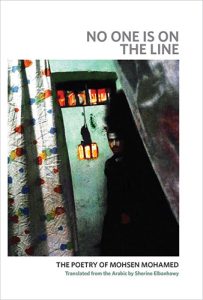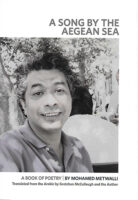
No One Is on the Line: The Poetry of Mohsen Mohamed
Translated from the Arabic by Sherine Elbanhawy
Laertes, September 2023
These poems arose from the depths of incarceration, from the voice and intellect of Mohsen Mohamed (sentenced to five years of imprisonment after a campus protest in 2014) and went on to win Egypt’s two most significant literary prizes. They speak of dislocation and the wrenching of the heart, of a found (and forged) community, of the bare lineaments of humanity disclosed in the throes of suffering. They are works of provocative witness and searching tenderness.
“Mohsen Mohamed is an honest poet with a new dictionary, a keen eye for details and surprising twists, and a great talent.” —Amin Haddad, poet, winner of the International Cavafy Prize for poetry

